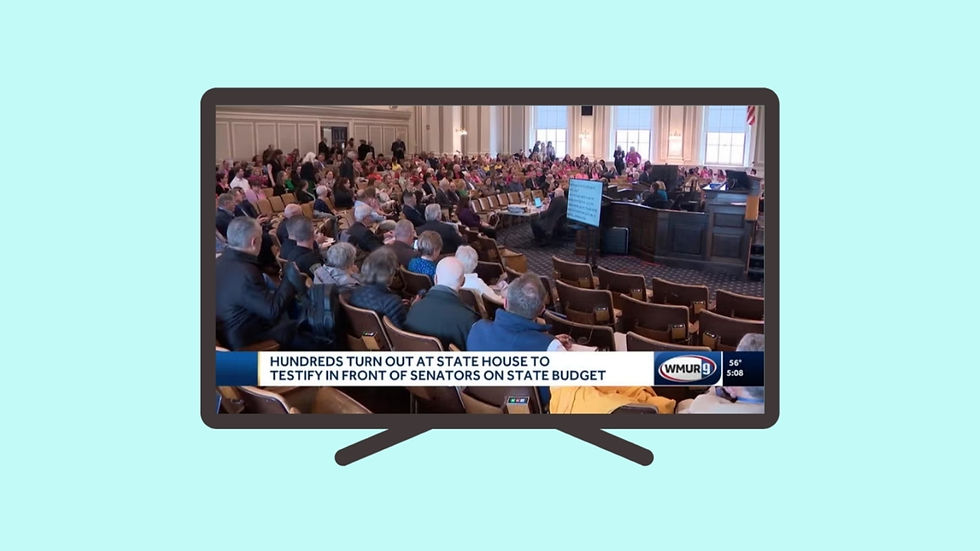How to Support or Oppose a Bill in NH—When Your Voice Matters Most
- Nicole Bump
- Jun 23, 2025
- 3 min read

New Hampshire’s legislative process is designed to be participatory. Every bill gets a public hearing. Every resident has a voice. But if you’ve ever tried to follow a bill from idea to law, you know it can move fast—and be confusing.
Whether you're a seasoned advocate or speaking up for the first time, understanding when and how to engage is key. Here's a step-by-step breakdown of the state legislative process—plus when the public can weigh in to support or oppose a bill.
Step 1: Bills Are Filed and Assigned to Committees
Bills originate in either the House of Representatives (HB) or the Senate (SB). Once drafted, they're assigned to a standing committee for review. This happens early in the session and sets the stage for public input.
🔎 Tip: As soon as you hear about a bill you care about, make note of its bill number, the committee it's assigned to, and begin tracking it on the House calendar or Senate calendar.
There’s no public input at this stage—but the next step is your moment.
Step 2: Public Hearings—Your First and Best Chance to Speak Up
New Hampshire is one of the few states that requires a public hearing on every bill. This is the primary opportunity for you to make your voice heard.
You can:
Testify in person (3-minute max recommended)
Submit written testimony
Register your support or opposition online
🖥️ Not attending in person? Use the House remote testimony portal or the Senate remote testimony portal.
Make sure you know the date, time, and location or link for the hearing. Sign in to testify or submit comments online in advance.
Step 3: Committee Action (Executive Session)
After the public hearing, the committee meets again to vote on its recommendation. This is known as an executive session, and while the public can observe, no testimony is allowed.
The committee may vote:
Ought to Pass
Ought to Pass as Amended
Inexpedient to Legislate
Refer to Interim Study
Re-refer to Committee
🗳️ Important: Testimony and public input from the earlier hearing directly influence this vote, so speaking up early is essential.
Step 4: The Floor Vote
Next, the bill moves to the full House or Senate floor for debate and a vote. Again, the public cannot testify at this stage—but your advocacy still matters.
📣 Tip: Contact your own legislators before the vote to share your position and ask how they plan to vote. Personal outreach can make a real difference.
Step 5: Conference Committees (If Needed)
If the two chambers pass different versions of a bill, a Committee of Conference is formed to negotiate a final version. These discussions are not open to public comment, but you can still reach out to legislators involved in the process to express your perspective.
Step 6: Governor’s Desk
If the bill passes both chambers in identical form, it heads to the Governor for a signature.
The Governor can sign the bill, veto it, or let it become law without a signature.
A veto can be overridden by a two-thirds vote in both chambers.
If the legislature has adjourned and the Governor takes no action within five days, the bill dies. This is called a pocket veto.
📨 Last call: Contact the Governor’s office to express your support or concerns before the deadline.
📨 Who to Contact—and When
Timing is everything. Here’s who you should contact at each stage to make the biggest impact:
Stage | Who to Contact | Why It Matters |
Before the Public Hearing | Committee Members | Share your personal story or position while they’re still reviewing testimony |
Before the Floor Vote | Your Representatives or Senators | Ask them to support or oppose the bill directly before the full vote |
During a Conference Committee | Legislators on the Committee | Urge them to retain or remove specific provisions during negotiation |
When the Bill Reaches the Governor | The Governor’s Office | Request that the Governor sign or veto the bill before it becomes law |
Want to learn how to give powerful, effective testimony that grabs attention and drives change? Stay tuned for our next post: How to Testify Like a Pro in the NH State House.



Comments